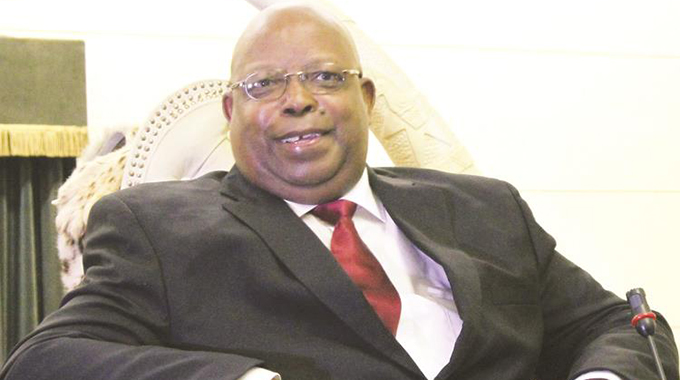Mudenda addresses State Duma

Farirai Machivenyika
Senior Reporter
National Assembly Speaker, Advocate Jacob Mudenda made history yesterday after addressing the plenary session of the State Duma Federal Assembly of the Russian Federation, where he praised the amicable relations that exist between Harare and Moscow.
Zimbabwe and Russia share cordial economic and political relations which date back to the liberation struggle.
Russia provided material support to Zimbabwe during the war and relations have continued to grow since then.
In his historic address yesterday, Advocate Mudenda commended Russia’s unwavering belief in Zimbabwe’s quest for self-determination, freedom and independence.
He said his visit to Russia was meant “cement that bedrock of our tested bilateral relations now being propagated by our current parliamentary diplomacy as under girded by the need for mutual benchmarking visits such as this one to the State Duma”.
“There is need for our two Assemblies to continually share best Parliamentary practices in order to enhance democracy, the rule of law and the upholding of human rights in our respective jurisdictions.
“Thank you for the invitation by the State Duma of the Eighth Convocation for this opportune occasion to learn from each other’s parliamentary best practices.”
Adv Mudenda said his delegation’s visit came in the middle of Russia’s special military campaign in Ukraine, which started on February 24, which he said was predicated on legitimate historical security concerns arising from the North Atlantic Treaty Organisation (NATO) and the United States’ expansionist policies that pose an incontrovertible danger to Moscow.
Zimbabwe’s position, said Adv Mudenda, remains steadfast in support of concerted efforts towards a peaceful resolution to the current conflict in the spirit of multilateralism and solidarity as defined by Article 2 of the United Nations Charter.
“However, this conflict between the Russian Federation and Ukraine is complex and deeply rooted in history and geopolitical dynamics.
“It is instructive to note that for centuries, the histories of Russia and Ukraine were intricately intertwined. Russian history began in what was called Kievan-Rus which is the current Kyiv, the capital city of Ukraine.
“The Russian religion and culture spread from there. Additionally, some of the most critical battles for Russian freedom, starting with the Battle of Poltava in 1709, were fought on Ukrainian soil,” said Adv Mudenda.
He added that the Black Sea Fleet, Russia’s means of projecting power in the Mediterranean, is based on a long-term lease in Sevastopol in Crimea.
“It is, therefore, axiomatic that the historical linkages between Russia and Ukraine are intricately coiled,” he said.
Adv Mudenda added that in the aftermath of the break-up of the former Union of Soviet Socialist Republics (USSR) and the end of the Cold War, NATO continued its scorched earth policy of advancing towards Russia by progressively co-opting former Soviet Republics into its political wing.
From 1999 to date, former Warsaw Pact members who include Poland, the Czech Republic, Hungary, Bulgaria, Latvia, Estonia, Lithuania, Romania, Slovakia, and Slovenia had joined NATO.
Adv Mudenda said the effect of this incorporation into NATO, which began to establish military bases in those countries, meant the Russian Federation “was literally hemmed in by its Cold War adversaries”.
“Overt attempts by NATO to incorporate Ukraine within its ambit, which shares a 2 000-kilometre border with the Russian Federation and is the largest of former Soviet states, raised a sense of insecurity on the part of the Russian Federation.
“That political context should be understood in that respect. Accordingly, the Russian Federation justifiably feels threatened by the presence of a NATO nuclear arsenal within touching distance of its borders and the Russian Federation’s special military operation should be understood in this context,” he said.
Adv Mudenda said Zimbabwe was not convinced that the United Nations resolution condemning Russia and the barrage of sanctions imposed against it was the correct way to solve the crisis.
On the contrary, sanctions actually add more fuel to the raging political fire, resulting in untold human suffering, loss of life and infrastructural destruction on both sides of the conflict, he said.
“It is Zimbabwe’s considered view that an earnest and constructive dialogue is the only viable option out of the deepening crisis.
“For Africa, it is imperative that the diplomatic dialogue needs consummation in order to curtail the negative impact of the conflict on the African continent’s trade with Russia and Ukraine,” he said.
Between 2018 and 2020, Africa imported US$3,7 billion in wheat (32 percent of the continent’s total wheat imports) from Russia and another US$1,4 billion from Ukraine (12 percent of the continent’s wheat imports) while Ukraine exported $2,9 billion worth of agricultural products to Africa in 2020.
Adv Mudenda reiterated that Zimbabwe was alive to the geopolitics and the historical context which informed the Russian Federation’s reaction and the current Russia-Ukraine conflict.
He added that as an unfortunate victim of illegal and unilateral western sanctions over the past two decades, Zimbabwe could closely relate to Russia’s situation and is convinced that cohesive measures will not result in any meaningful solution.
“That is why our President, Dr ED Mnangagwa, rejected President Biden’s call that Zimbabwe should support sanctions against Russia. “President Mnangagwa retorted that victims of sanctions are comrades in arms against the sanctions battle,” said Adv Mudenda.
Adv Mudenda commended Russia and Ukraines’ efforts to resolve the conflict through dialogue led by President Recep Tayyip Erdogan of Turkey.
Adv Mudenda said while it was accepted that in line with the UN Charter, every State has the right to associate with any other State on the basis of the sovereign equality of nations, but each State also has a sacrosanct responsibility to avoid overt and covert threats towards other States.









Comments